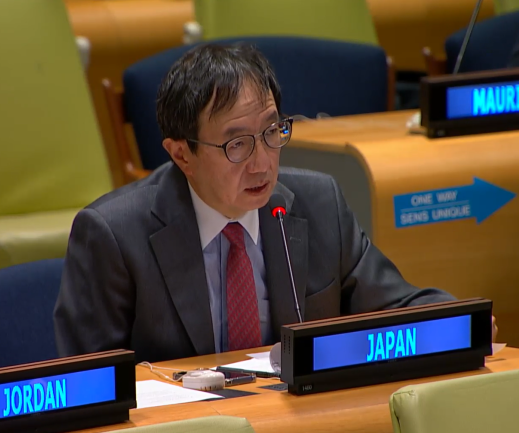安保理改革に関する政府間交渉(IGN)における山﨑大使ステートメント
令和6年1月22日

(Check against delivery)
Co-Chairs,It is my great honor to participate in the Intergovernmental Negotiations on Security Council reform (IGN) for the first time, and to deliver this statement on behalf of the G4 – Brazil, Germany, India, and my own country, Japan.
Thank you very much for convening this round of structured dialogue dedicated to “models” of reform. We, the G4, are committed to a sincere discussion in a constructive manner, and thus already submitted our own model of reform before the end of last year. It is our strong hope that this dialogue will lead to more convergence and less divergence on each issue. This will, in turn, hopefully also result in solid and forward-looking language, which garners the widest possible majority support, to be inserted into the Pact for the Future.
With this goal in mind, we are grateful to Mexico and Liechtenstein for their presentations today. We also urge other Member States to submit their respective models for deliberation in this round of the IGN.
To Mexico
Thank you, again, for your willingness to engage in this in-depth discussion with a constructive approach that goes beyond well-known positions brought forward by the UfC group so far – new ideas and the willingness to advocate for “text-oriented negotiations” are well noted. It has long been our position that we cannot achieve a consensus without negotiation on something in writing.
Our initial questions and remarks to you are as follows:
- First and foremost, your current proposal rules out an option of increasing permanent seats. We note that the overwhelming majority, including at least four permanent members, supports the idea of expanding both permanent and non-permanent categories. Maintaining the current permanent category as is would not do justice to the geopolitical realities of the 21st century.
- In particular, as African colleagues pointed out last time, there are only two categories in the UN Charter – permanent and non-permanent with a two-year term, and no category in-between, therefore Africa demands permanent seats. How do you think your model can fully address the historical injustice vis-à-vis Africa?
However, we see the proposed re-electable seats of maximum eight years as clearly different from the current non-re-electable seats of two years. Such a new category might even increase divisions among non-permanent members. What do you think?
- You propose an expansion of 10 new elected seats resulting in a total of 25 members, which seems not to match the traditional UfC proposal. Could you elaborate on the rationale behind this position?
- You propose that among five longer-term elected seats assigned to the AG and APG, one shall always be given to an Arab country. Could you elaborate more on how the system would work? For instance, is it supposed to say “at least one shall always be assigned to an Arab country,” meaning that there could also be more than one?
- On the question of the veto, what is your view on the legitimacy of the current permanent members’ use or threat of use of the veto?
Thank you, Co-Chairs.
To Liechtenstein
Thank you, again, for your willingness to engage in this in-depth discussion. We appreciate your constructive attitude.
Our initial questions to you are as follows:
- Could you elaborate more on “members elected to serve on a permanent basis?”
- The proposed re-electable seats of maximum eight/ten years are clearly different from the current non-re-electable seats of two years. We would have the same remark we made to the Mexican proposal: African colleagues pointed out last time that there are only two categories in the UN Charter – permanent and non-permanent with a two-year term, and none in-between, therefore Africa demands permanent seats. How do you think the historical injustice vis-à-vis Africa can be fully addressed by your elected seats “on a permanent basis?”
- On the question of the veto, what is your view on the legitimacy of the current permanent members’ use or threat of use of the veto?
Thank you, Co-Chairs.
